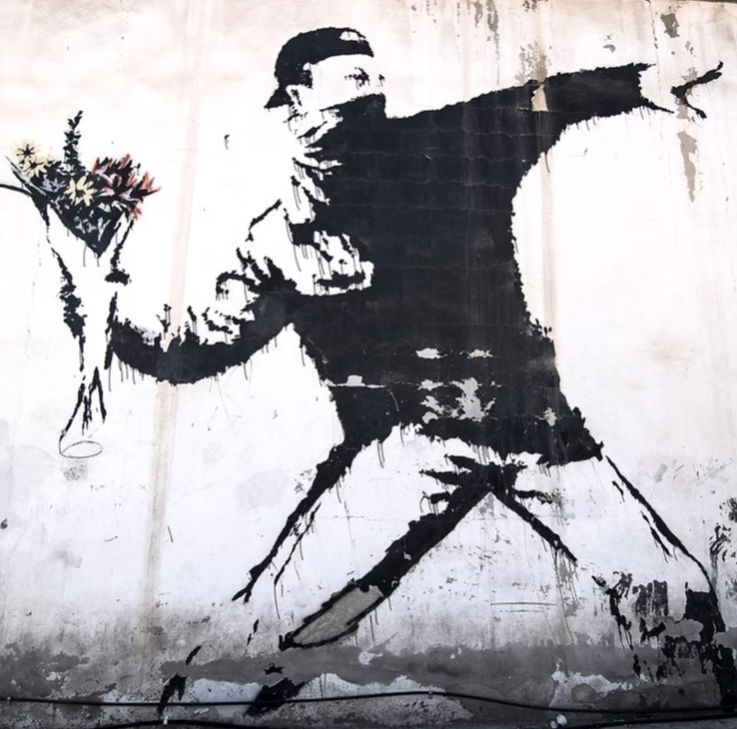When, If Ever, is Violence Justified?
Most of us want to believe we're peaceful people who would never resort to violence, yet we live in a world where force is used constantly in our name: police enforce laws, militaries defend borders, and justice systems punish wrongdoers. Even in our personal lives, we might fantasize about striking back at those who hurt us or our loved ones. This gap between our peaceful ideals and violent realities raises uncomfortable questions about when, if ever, force might be necessary or justified.
The question becomes more complex when we consider different types of violence: state violence versus personal violence, defensive versus offensive force, violence that preserves order versus violence that challenges injustice. How do we distinguish between necessary force and harmful aggression? Who gets to decide when violence is legitimate, and what makes their authority valid?
Our conversation will explore:
What separates justice from revenge?
Who has the right to use violence, and who decides?
Can any act of violence be truly transformative?

When, If Ever, is Violence Justified?

Most of us want to believe we're peaceful people who would never resort to violence, yet we live in a world where force is used constantly in our name: police enforce laws, militaries defend borders, and justice systems punish wrongdoers. Even in our personal lives, we might fantasize about striking back at those who hurt us or our loved ones. This gap between our peaceful ideals and violent realities raises uncomfortable questions about when, if ever, force might be necessary or justified.
The question becomes more complex when we consider different types of violence: state violence versus personal violence, defensive versus offensive force, violence that preserves order versus violence that challenges injustice. How do we distinguish between necessary force and harmful aggression? Who gets to decide when violence is legitimate, and what makes their authority valid?
Our conversation will explore:
What separates justice from revenge?
Who has the right to use violence, and who decides?
Can any act of violence be truly transformative?

Most of us want to believe we're peaceful people who would never resort to violence, yet we live in a world where force is used constantly in our name: police enforce laws, militaries defend borders, and justice systems punish wrongdoers. Even in our personal lives, we might fantasize about striking back at those who hurt us or our loved ones. This gap between our peaceful ideals and violent realities raises uncomfortable questions about when, if ever, force might be necessary or justified.
The question becomes more complex when we consider different types of violence: state violence versus personal violence, defensive versus offensive force, violence that preserves order versus violence that challenges injustice. How do we distinguish between necessary force and harmful aggression? Who gets to decide when violence is legitimate, and what makes their authority valid?
Our conversation will explore:
What separates justice from revenge?
Who has the right to use violence, and who decides?
Can any act of violence be truly transformative?
Conversation Catalysts
At Premise, a Conversation Catalyst is a short story, essay, film, or poem that sparks reflection and connection. It’s the shared reference point that grounds each session and opens the door to meaningful and deep conversation.

In the Bedroom, a film directed by Todd Field
"Critique of Violence" by Walter Benjamin
Preparation: < 3 hours
%20copy_edited.png)
We examine how personal grief and state authority both grapple with the limits and legitimacy of force.
In the Bedroom directed by Todd Field
Field's film follows Matt and Ruth Fowler, whose son is murdered by his girlfriend's abusive ex-husband. When the legal system fails to provide what feels like adequate justice, Matt contemplates taking matters into his own hands. The film explores how ordinary people can be driven toward violence when institutional justice feels insufficient, examining the psychological and moral costs of revenge.
_edited.png)
In the Bedroom, a film directed by Todd Field
"Critique of Violence" by Walter Benjamin
Preparation: < 3 hours
We examine how personal grief and state authority both grapple with the limits and legitimacy of force.
In the Bedroom directed by Todd Field
Field's film follows Matt and Ruth Fowler, whose son is murdered by his girlfriend's abusive ex-husband. When the legal system fails to provide what feels like adequate justice, Matt contemplates taking matters into his own hands. The film explores how ordinary people can be driven toward violence when institutional justice feels insufficient, examining the psychological and moral costs of revenge.
Conversation Catalysts
At Premise, a Conversation Catalyst is a short story, essay, film, or poem that sparks reflection and connection. It’s the shared reference point that grounds each session and opens the door to meaningful and deep conversation.
In the Bedroom, a film directed by Todd Field
"Critique of Violence" by Walter Benjamin

Text Set A
Preparation: < 3 hours
Session Description
We examine how personal grief and state authority both grapple with the limits and legitimacy of force.
In the Bedroom directed by Todd Field
Field's film follows Matt and Ruth Fowler, whose son is murdered by his girlfriend's abusive ex-husband. When the legal system fails to provide what feels like adequate justice, Matt contemplates taking matters into his own hands. The film explores how ordinary people can be driven toward violence when institutional justice feels insufficient, examining the psychological and moral costs of revenge.
The story forces viewers to confront their own feelings about retribution and justice. Field asks: When institutions fail us, do we have the right to seek our own justice? What is the difference between justice and revenge when both involve inflicting pain on those who have wronged us?
"Critique of Violence" by Walter Benjamin
Benjamin's complex philosophical essay examines the relationship between law, violence, and state power. He argues that legal systems are founded on violence and maintained through the threat of force, questioning whether any violence can be truly just or whether all force is ultimately corrupting. Benjamin explores the difference between violence that preserves existing order and violence that creates new possibilities.
The essay challenges fundamental assumptions about legitimate authority and the rule of law. Benjamin asks: What gives any institution the right to use violence? Can violence ever create justice, or does it only perpetuate cycles of harm? What would it mean to imagine justice without force?
Text Set A
Preparation: < 3 hours
Session Description
We examine how personal grief and state authority both grapple with the limits and legitimacy of force.
In the Bedroom directed by Todd Field
Field's film follows Matt and Ruth Fowler, whose son is murdered by his girlfriend's abusive ex-husband. When the legal system fails to provide what feels like adequate justice, Matt contemplates taking matters into his own hands. The film explores how ordinary people can be driven toward violence when institutional justice feels insufficient, examining the psychological and moral costs of revenge.
The story forces viewers to confront their own feelings about retribution and justice. Field asks: When institutions fail us, do we have the right to seek our own justice? What is the difference between justice and revenge when both involve inflicting pain on those who have wronged us?
"Critique of Violence" by Walter Benjamin
Benjamin's complex philosophical essay examines the relationship between law, violence, and state power. He argues that legal systems are founded on violence and maintained through the threat of force, questioning whether any violence can be truly just or whether all force is ultimately corrupting. Benjamin explores the difference between violence that preserves existing order and violence that creates new possibilities.
The essay challenges fundamental assumptions about legitimate authority and the rule of law. Benjamin asks: What gives any institution the right to use violence? Can violence ever create justice, or does it only perpetuate cycles of harm? What would it mean to imagine justice without force?
Conversation Catalysts
At Premise, a Conversation Catalyst is a short story, essay, film, or poem that sparks reflection and connection. It’s the shared reference point that grounds each session and opens the door to meaningful and deep conversation.
"A Good Man Is Hard to Find" by Flannery O'Connor
"Letter from Birmingham Jail" by Martin Luther King Jr.

Text Set B
Preparation: < 3 hours
Session Description
We investigate how moral violence and principled nonviolence offer different responses to evil and injustice.
"A Good Man Is Hard to Find" by Flannery O'Connor
O'Connor's disturbing story follows a family whose vacation turns deadly when they encounter an escaped convict called The Misfit. The story explores questions of morality, grace, and violence through the grandmother's final moments of recognition and The Misfit's philosophical reflections on punishment and meaning. The violence is both random and deliberate, raising questions about evil and moral authority.
The story forces readers to confront violence that seems to serve no clear purpose yet reveals something essential about human nature. O'Connor asks: What distinguishes meaningful violence from senseless brutality? How do we respond to violence that cannot be explained or justified by traditional moral frameworks?
"Letter from Birmingham Jail" by Martin Luther King Jr.
Writing from prison, King defends civil disobedience while explicitly rejecting violence as a tool for social change. He argues that nonviolent resistance can be more powerful than force because it appeals to the conscience of opponents and creates moral pressure for change. King acknowledges the frustration that leads to violence while advocating for disciplined nonviolence.
King's letter presents a counterpoint to arguments for necessary violence. He asks: Can nonviolent resistance achieve what violence cannot? What makes some forms of lawbreaking morally justified while others are not? How do we maintain hope for change without resorting to force?
Text Set A
Preparation: < 3 hours
Session Description
We examine how personal grief and state authority both grapple with the limits and legitimacy of force.
In the Bedroom directed by Todd Field
Field's film follows Matt and Ruth Fowler, whose son is murdered by his girlfriend's abusive ex-husband. When the legal system fails to provide what feels like adequate justice, Matt contemplates taking matters into his own hands. The film explores how ordinary people can be driven toward violence when institutional justice feels insufficient, examining the psychological and moral costs of revenge.
The story forces viewers to confront their own feelings about retribution and justice. Field asks: When institutions fail us, do we have the right to seek our own justice? What is the difference between justice and revenge when both involve inflicting pain on those who have wronged us?
"Critique of Violence" by Walter Benjamin
Benjamin's complex philosophical essay examines the relationship between law, violence, and state power. He argues that legal systems are founded on violence and maintained through the threat of force, questioning whether any violence can be truly just or whether all force is ultimately corrupting. Benjamin explores the difference between violence that preserves existing order and violence that creates new possibilities.
The essay challenges fundamental assumptions about legitimate authority and the rule of law. Benjamin asks: What gives any institution the right to use violence? Can violence ever create justice, or does it only perpetuate cycles of harm? What would it mean to imagine justice without force?
